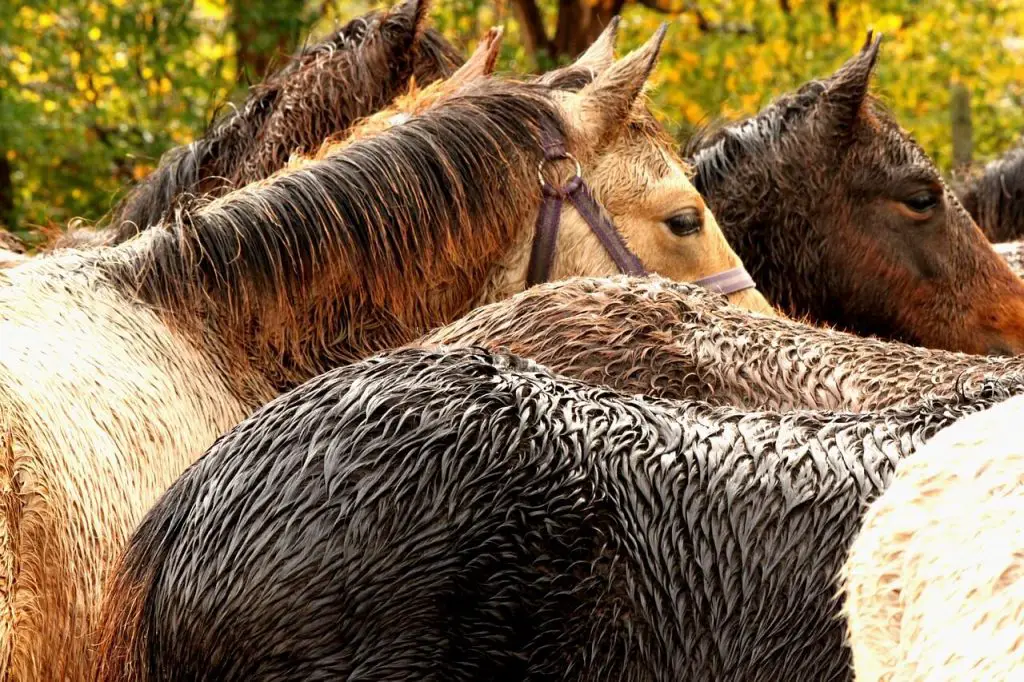How Do Horses Sweat? Horses sweat to cool down their bodies when they become overheated. They primarily sweat through the hair on their skin, which is why they are often wet after a hard workout or in hot weather. Sweating can also be a sign of emotional stress and excitement.
Horses have two types of sweat glands: Eccrine glands, which are distributed all over the body, and apocrine glands, located in thicker areas of hair like the mane and tail. When horses exercise, blood flow increases to carry heat away from muscles to absorb it into the environment. The eccrine glands then release fluid containing mostly electrolytes onto the horse’s coat as a way for them to cool off quickly by evaporation.
Horses are able to sweat in order to cool down and regulate their body temperature. Sweating helps release heat from the body, allowing a horse to maintain its internal temperature even during hot weather or periods of intense exercise. The sweat glands found on horses are located around the neck, withers (shoulder area), flanks (side ribs) and chest; each gland is responsible for releasing its own type of sweat.
While sweating may be a natural process for horses, it’s important that owners pay attention to how much their animal sweats so they can provide proper cooling-off time if needed.
Do Horses Sweat Through Their Hooves
No, horses do not sweat through their hooves. Horses have sweat glands all over their body, including around the muzzle and on the legs and flanks. Although it may appear that horses are sweating through their hooves due to wetness or condensation, this is actually just caused by dew or moisture from the ground sticking to them.
Where Do Horses Sweat From?
Horses are able to sweat in order to cool down, just like humans do. However, the way they sweat is a bit different. While human sweat comes from the surface of our skin, horses actually have glands that secrete sweat from their body’s hair follicles.
The majority of this sweat will come from their neck and flanks which are areas where large amounts of blood flow through compared to other parts of the body- making them ideal for cooling down quickly. Additionally, some horse breeds may also have additional sweating points on their legs or lower back depending on what type they are. Horses have an incredible ability to regulate their own temperatures when exercising and sweating is one important way for them to do so!
What is Special About Horse Sweat?
Horses sweat differently than humans and for good reason. Horse sweat is unique because it contains electrolytes that help to regulate the body temperature of horses in hot weather. In addition to electrolytes, horse sweat also contains proteins that act as a natural cooling system for the animal – when it evaporates off the horse’s skin, heat is taken away with it, helping cool down the body.
As well as providing a cooling effect on hot days, horse sweat also acts as an antiseptic agent which helps protect against fungal and bacterial infections common in horses such as rain rot or scratches. The special properties of horse sweat mean that it can be beneficial when used topically too; many owners use their own animals’ perspiration to treat wounds or soothe inflamed skin after strenuous exercise/workout sessions. All these reasons make horse sweat quite unique among other species!
Do Horses Sweat Through Their Skin?
Yes, horses do sweat through their skin. Sweat is the horse’s body’s primary way of cooling down when its environment is too hot or humid for it to handle. Unlike humans, horses only have two sweat glands located on either side of their neck and shoulder area.
The rest of their body has a much smaller number of sweat glands concentrated in areas such as their flanks and belly. When a horse sweats, the liquid evaporates off the skin which creates a cooling effect on the whole equine body. In addition to sweating through their skin, horses also pant in order to cool themselves down further by releasing heat from the lungs and nose via evaporation.
This can be especially beneficial during exercise when they are working hard and need extra cooling power to help them keep going at peak performance levels!
Why is Horses Sweat White?
Horses sweat white because it is due to their unique way of regulating body temperature. Horses have more sweat glands than humans, and they are concentrated in areas such as the neck, flanks, and chest. Unlike our own sweat glands which produce a colorless fluid when we perspire, horses’ sweat glands secrete a milky white liquid.
This milky substance is composed mainly of amino acids and electrolytes like sodium chloride that help to regulate body temperatures. Horse bodies are designed so that this coolant can be spread over the skin by brushing or rolling in the dirt, providing an efficient cooling system for extended periods of physical activity. Sweat also helps keep your horse’s coat shiny since it contains oils and other nutrients essential for healthy skin and hair growth.
Horse sweat fun facts #shorts
Conclusion
Horses are unique animals in the way they cool themselves down through sweating. Unlike humans, horses sweat all over their bodies and have an extensive system of blood vessels that help to regulate their temperature. By understanding how horses sweat and regulating your horse’s activity level, you can help make sure your horse stays healthy and comfortable when working in hot weather.
With proper maintenance, exercise, and nutrition, you can ensure your horse remains healthy even during extreme temperatures.
Janet G Kulick is an experienced horse rider, trainer, and owner of the informative horse blog, Horseray.com. Her engaging writing style and wealth of knowledge on horse care, riding, and training make her a trusted source for horse enthusiasts worldwide.






